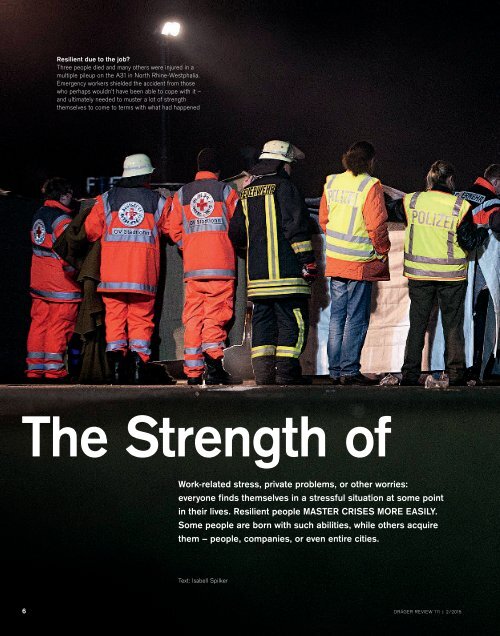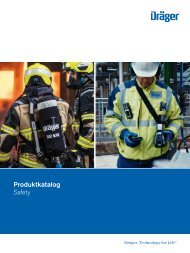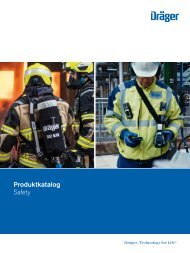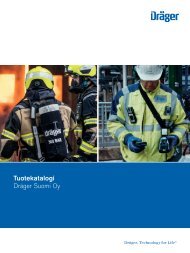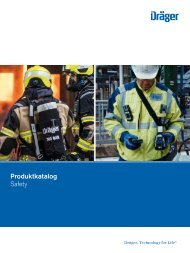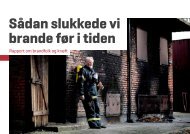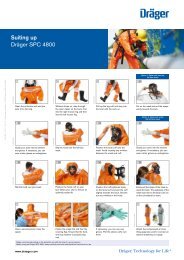Create successful ePaper yourself
Turn your PDF publications into a flip-book with our unique Google optimized e-Paper software.
<strong>Resilient</strong> due to the job?<br />
Three people died and many others were injured in a<br />
multiple pileup on the A31 in North Rhine-Westphalia.<br />
Emergency workers shielded the accident from those<br />
who perhaps wouldn’t have been able to cope with it –<br />
and ultimately needed to muster a lot of strength<br />
themselves to come to terms with what had happened<br />
The Strength of<br />
Work-related stress, private problems, or other worries:<br />
everyone finds themselves in a stressful situation at some point<br />
in their lives. <strong>Resilient</strong> people MASTER CRISES MORE EASILY.<br />
Some people are born with such abilities, while others acquire<br />
them – people, companies, or even entire cities.<br />
Text: Isabell Spilker<br />
6 DRÄGER REVIEW 111 | 2 / 2015
MENTAL STRENGTH<br />
FOCUS<br />
PHOTO: DDP IMAGES<br />
the <strong>Resilient</strong><br />
DRÄGER REVIEW 111 | 2 / 2015<br />
7
FOCUS<br />
MENTAL STRENGTH<br />
T<br />
The emergency call was received by the call center at<br />
9:33 a.m. What happened in the hours that followed would require<br />
thousands of workers and drive them to the limit of human<br />
tolerance. In March 2009 a former student of a school in the<br />
small town of Winnenden in Baden-Württemberg shot dead 15<br />
people – and ultimately himself. Martin Luitjens was<br />
also on the scene. As a leading emergency pastoral<br />
care worker he took care of the survivors and emergency<br />
crews by being there to talk to them. By the<br />
time evening came, the man who usually helps others<br />
to cope with traumatic experiences noticed that<br />
even his strength was waning. Emergency crews who<br />
have to recover children’s bodies, police officers who<br />
witness their colleagues being gunned down – they<br />
all work in these inhuman situations. Once everything<br />
has calmed down, stress takes its toll. However, those<br />
who do not possess the mechanism that psychologists<br />
call “resilience” will have big problems coping with<br />
their everyday lives. “People who come home after such a day at<br />
work are not initially in a position to come to terms with what has<br />
happened,” says Luitjens, who also works as a resilience coach.<br />
“They are disoriented at first, because the psyche needs time.”<br />
Some people pull themselves together within a few days, while<br />
others need months, sometimes even years – or an entire lifetime.<br />
Tolerance to disruptions<br />
Resilience describes the psychological ability to cope with and<br />
recover from difficulties. The concept can be assigned to systems,<br />
organizations, infrastructures, materials, and entire societies.<br />
Across a number of different disciplines it describes people’s<br />
tolerance to disruptions – and the ability to take the measures<br />
needed to ensure that the serious situation doesn’t even occur in<br />
the first place or at the very least mitigate its impact. This works<br />
in a hospital as much as within other complex systems. An example:<br />
in recent years the impact of climate change on cities has<br />
been analyzed. The focus of the analysis was on how the cities<br />
8 DRÄGER REVIEW 111 | 2 / 2015
The noise was alarming, the scene incomprehensible:<br />
on June 3, 1998 the high-speed ICE train “Wilhelm Conrad<br />
Röntgen” derailed in Eschede near Celle. The train accident was<br />
the first major catastrophe in Germany in which the emergency<br />
crews received systematic follow-up care. A total of 700 of around<br />
2,000 workers took advantage of the assistance over a period<br />
of three years; 100 had long-term problems – they suffered from<br />
internal unrest and could barely sleep<br />
Resilience<br />
can protect the<br />
mind – like an<br />
immune system<br />
manage to brave the extreme weather and return to normality as<br />
quickly as possible afterward. An aptitude for learning is a further<br />
dimension of this robustness and capacity to cope. A resilient<br />
system is in a position to learn and adapt to changing conditions.<br />
“In relation to people, resilience describes the mechanisms<br />
which ensure that they emerge stronger from stressful and demanding<br />
situations,” explains Michèle Wessa, professor of clinical<br />
psychology and neuropsychology at the Johannes Gutenberg<br />
University in Mainz. Europe’s first center for resilience research<br />
opened here in the summer of 2014 with the aim of understanding<br />
the principles of resilience on a molecular and neuroscientific<br />
level and by conducting animal experiments. The idea is to develop<br />
new prevention methods on the basis of the findings.<br />
The demand for effective concepts is rising. The psychological<br />
constitution of man has become a popular subject. Despite<br />
increased prosperity and (compared to bygone days) lower lev-<br />
PHOTO: DPA/SÜDDEUTSCHE ZEITUNG PHOTO<br />
els of physical exertion, many people are under enormous pressure<br />
both at work and at home. If you are unable to keep up, you<br />
lose – at least that’s how it seems to many people. General studies<br />
of the mental health of employees in medical careers reveal,<br />
for instance, that at least 20 percent of doctors suffer from burnout<br />
syndrome. Work-related stress is one of the biggest challenges<br />
of the present age. Resilience is the flip side of it all and the<br />
thing that can protect people – like a callus.<br />
“What doesn’t kill me only makes me stronger”<br />
Yet how is this protection mechanism formed? Systems can be<br />
made more resilient, but people? Resilience can protect the mind<br />
and prevent illness after intensive negative experiences. And just<br />
like an immune system it is more pronounced and effective in<br />
some people than in others. So why are some people more resilient<br />
than others? Is it genetic, is it acquired<br />
during childhood, or does it develop during TOUGH SHELL<br />
the transition to adulthood? Or can resilience<br />
The American<br />
evolve at any of these stages? The formula Psychological Association<br />
could be simple. An essen tially optimistic child has developed a<br />
is not wrapped in cotton wool by its parents, ten-point plan which<br />
but is exposed to the oc casional crisis. He or can pave the way<br />
she goes through life as a mentally strong adult to greater resilience:<br />
and faces any adversity with an inner robustness.<br />
Stephen Joseph carries out research in 2. Avoid seeing<br />
1. Make connections.<br />
precisely this area. He coordinates the psychotherapeutic<br />
and practical psychology course problems.<br />
crises as insurmountable<br />
at the School of Education at the University<br />
of Nottingham and was head of the Cen-<br />
is a part of living.<br />
3. Accept that change<br />
tre for Trauma, Resilience and Growth there<br />
4. Move toward<br />
your goals.<br />
until 2013 as professor of psychology: “Many 5. Take decisive actions.<br />
of the skills that adults possess are the result 6. Look for opportunities<br />
of training during childhood. We must learn for “self-discovery.”<br />
how to cope with difficult situations. Those 7. Nurture a positive<br />
who are confronted with adversity and catastrophe<br />
will show a higher degree of resilience<br />
view of yourself.<br />
8. Keep things in<br />
perspective.<br />
9. Maintain a hopeful<br />
outlook.<br />
10. Take care<br />
of yourself.<br />
DRÄGER REVIEW 111 | 2 / 2015<br />
9
FOCUS<br />
MENTAL STRENGTH<br />
“The culture<br />
within the organization<br />
will also<br />
determine how<br />
resilient emergency<br />
workers are”<br />
if they have learned from early experiences.” Accordingly,<br />
he also essentially sees the positive side of crises<br />
and concurs with Friedrich Nietzsche’s Twilight of<br />
the Idols: “What doesn’t kill me only makes me stronger.”<br />
Stephen Joseph borrowed from Nietzsche for the<br />
title of his book (What Doesn’t Kill Us) and tells stories<br />
of people who have managed to emerge stronger<br />
from setbacks. “Post- traumatic growth also means<br />
learning from trauma: setting new priorities and finding<br />
out what is really important.” However, those who<br />
have no positive experience of coping with crises, that is to say<br />
those who have been unable to come to terms with previous experiences,<br />
will be more vulnerable. This has also been shown by<br />
a study in which Joseph was involved in 1987 following the ferry<br />
disaster near the Belgian port of Zeebrugge in which 193 people<br />
died. Survivors who had to deal with further crises (such as<br />
a severe illness or the loss of a relative) in the three years afterward<br />
proved to be even more vulnerable than a reference group.<br />
“Those who are as cool as a<br />
cucumber are by no means resilient”<br />
Something else became clear from the study: people who were<br />
unable to show their feelings and who lacked social support fared<br />
especially badly. A finding also shared by resilience coach Luitjens:<br />
“Social support is a driving factor. Resilience has a great deal to<br />
do with the personal environment – as in the case of emergency<br />
crews, for instance. The culture within the organization will<br />
also determine how resilient they are.” Is it not possible to simply<br />
talk to one another after a callout and just say that something<br />
didn’t go so perfectly? “Structures which live by the myth<br />
of being invulnerable and in all probability being able to remain<br />
as cool as a cucumber make it difficult to deal with demanding<br />
situations. In such an environment hardly anyone has the courage<br />
to admit to a supposed weakness.” In his opinion and experience,<br />
social resources – in other words, the support within the<br />
group – are the crucial factors which lead to greater resilience.<br />
The researcher Michèle Wessa goes one step further here: “The<br />
link is not as strong as people thought. Although these attributes<br />
and factors (optimism, social support, and early experiences) do<br />
have a significant influence, they are not sufficient to predict how<br />
resilient an individual will be in a situation.” Resilience is probably<br />
a combination of different factors and mechanisms. “If it were<br />
merely attributes that made us resilient, then somebody would remain<br />
resilient throughout their entire life. But that isn’t the case.<br />
An example: many emergency workers go through their professional<br />
lives without suffering any damage – and then something<br />
suddenly knocks them off their feet. This seems to confirm that<br />
there are resources which are somehow built up over time, but<br />
can also be exhausted at some point.<br />
Inherent feature of many training courses<br />
The German Resilience Center is trying to catch this moment<br />
with a specially established outpatient clinic. It is not aimed at<br />
people who are in the middle of a crisis and are in desperate need<br />
of resilience; it is more for stressed people and institutions before<br />
the first serious situation occurs so that it can be countered<br />
Entering the<br />
water with the<br />
hope of finding<br />
survivors,<br />
only to recover<br />
bodies:<br />
the Costa<br />
Concordia maritime<br />
accident off<br />
the Italian coast<br />
demanded mental<br />
strength from<br />
the diving team<br />
10 DRÄGER REVIEW 111 | 2 / 2015
Interview<br />
<strong>Resilient</strong><br />
equipment<br />
Five years ago Dräger set up a<br />
division which tests medical-technical<br />
equipment in more practice-based<br />
settings, making it more resilient to<br />
adverse environmental influences.<br />
Dirk Zumtobel is head of the product<br />
reliability division.<br />
Mr. Zumtobel, quality assurance<br />
is taken for granted these days.<br />
What do you do to go further?<br />
Zumtobel: The conventional standards<br />
applied to functional testing in<br />
the area of quality assurance were<br />
no longer sufficient for us. We<br />
also test system stability over a longer<br />
period of time – and under “clinical<br />
conditions.” Flawless components do<br />
not necessarily produce a perfect<br />
system. This is precisely what we work<br />
on: we make sure that our components<br />
are free from defects and function within<br />
the overall system in everyday use.<br />
Have you built a small hospital<br />
for this purpose?<br />
Zumtobel: Yes, kind of. In our<br />
quality lab we are technically in<br />
a position to simulate everyday<br />
clinical situations. We subject 25 or<br />
more devices of a certain type<br />
to stress under various conditions,<br />
record the results, and evaluate<br />
them statistically. This makes it<br />
possible to give statements<br />
about the robustness and reliability<br />
of our systems in the field.<br />
What conditions do you subject<br />
the equipment to?<br />
Zumtobel: As many predictable ones<br />
as possible – severely obese patients,<br />
premature babies (who need to be<br />
gently ventilated), regular disinfection<br />
measures (with various detergents<br />
and methods), temperature and pressure<br />
changes, power supply fluctuation,<br />
and many more besides.<br />
What were the initial findings?<br />
Zumtobel: After the first test runs<br />
with prototypes we were surprised at<br />
how many events were actually<br />
recorded. Not everything is immediately<br />
noticed by the user. It revealed to use<br />
the areas where the system architecture<br />
is still “shaky” – in a similar way to a<br />
PC system which can also occasionally<br />
hang during an application.<br />
So the equipment is made<br />
resilient against itself in<br />
the first instance. What kind<br />
of external influences must<br />
it also be protected from?<br />
Zumtobel: The biggest challenge<br />
confronting technology is actually the<br />
user. Everything is generally OK<br />
as long as the equipment is used in<br />
accordance with the operating<br />
instructions, if there were no “foreseeable<br />
misuse.” To this end, we regularly<br />
let people with clinical and technical<br />
knowledge operate our new technologies<br />
without formal product training. In<br />
addition, we subject the equipment<br />
to further unpredictable situations: the<br />
use of unsuitable accessories, switching<br />
it off suddenly, incorrect cleaning, and<br />
much more besides. This gives us<br />
more insight which helps us to make<br />
the equipment even more resilient<br />
during the development phase.<br />
DRÄGER REVIEW 111 | 2 / 2015<br />
11<br />
PHOTO: PICTURE ALLIANCE/DPA
FOCUS<br />
MENTAL STRENGTH<br />
accordingly with stress management and relaxation techniques<br />
as well as a social network which offers assistance. Measures<br />
that promote resilience are often an inherent feature of training<br />
courses for firefighters, police officers, and pilots. It is important<br />
to realize the following: “There is no such thing as resilient or not<br />
resilient! Every individual has a certain limit which is<br />
sometimes sufficient for the challenges they face –<br />
but sometimes they go beyond this limit,” says Martin<br />
Luitjens. It took three days for him to regain his composure<br />
after his experiences in Winnenden. “Naturally<br />
I know about the coping process and what I need to<br />
do to get back on my feet.” Luitjens is well equipped.<br />
However, he also knows that even though an individual<br />
reacted resiliently to a certain situation last year,<br />
it doesn’t necessarily mean that they will do so again<br />
on the next occasion. Nothing can be predicted, but<br />
everyone can arm themselves against it.<br />
LITERATURE AND LINKS<br />
Stephen Joseph: What Doesn’t Kill Us.<br />
288 pages, Jackson/TN, USA, Basic Books, 2013<br />
Karen Reivich, Andrew Shatte: The Resilience Factor:<br />
7 Keys to Finding Your Inner Strength and Overcoming Life’s Hurdles.<br />
352 pages, Harmony Publishers, New York, 2013<br />
American Psychological<br />
Association:<br />
www.apa.org/helpcenter/road-resilience.aspx<br />
Resilence Training Institute<br />
(Branches throughout the USA)<br />
www.resiliencetraininginstitute.com<br />
“There is no such<br />
thing as resilient or<br />
not resilient!”<br />
12 DRÄGER REVIEW 111 | 2 / 2015
Even though the job requires a certain<br />
robustness, the image of the tough firefighter has<br />
changed in recent years. Nowadays, emergency<br />
workers can admit that callouts lasting several hours,<br />
such as this major fire, can really get to them<br />
HOW STRONG IS YOUR MENTAL IMMUNE SYSTEM?<br />
People react very differently to demanding experiences. This<br />
is primarily due to their individual mental resilience. Take this<br />
test to determine how resilient you are. Mark the box which<br />
generally indicates the extent to which the following statements<br />
apply to you. Add up all the points at the end – you can<br />
check your score below.<br />
1. When I have plans, I see them through.<br />
1 2 3 4 5 6 7<br />
2. I usually manage to do everything somehow.<br />
1 2 3 4 5 6 7<br />
3. I am not thrown off<br />
course that easily.<br />
1 2 3 4 5 6 7<br />
4. I like me.<br />
1 2 3 4 5 6 7<br />
5. I can multitask.<br />
1 2 3 4 5 6 7<br />
6. I am decisive.<br />
1 2 3 4 5 6 7<br />
7. I take things as they come.<br />
1 2 3 4 5 6 7<br />
8. I take an interest in many different things.<br />
1 2 3 4 5 6 7<br />
9. I can usually see a situation from more<br />
than one perspective.<br />
1 2 3 4 5 6 7<br />
10. I can also force myself to do things that<br />
I don’t really want to do.<br />
1 2 3 4 5 6 7<br />
11. When I am in a difficult situation, I usually<br />
find a way out.<br />
1 2 3 4 5 6 7<br />
12. I have enough energy to do all the things<br />
I have to do.<br />
1 2 3 4 5 6 7<br />
13. I can accept the fact that not everybody<br />
likes me.<br />
1 2 3 4 5 6 7<br />
Based on: Karena Leppert et al, Klinische Diagnostik und<br />
Evaluation magazine, 2008, pp. 226–243; with permission.<br />
SCORE<br />
58 points or less: You are not very<br />
resilient. However, this does not<br />
mean that you are at the mercy of<br />
life’s difficult situations, but you<br />
are more likely to need help working<br />
through a challenging situation<br />
than others who are confronted with<br />
the same difficulties.<br />
59 to 82 points: You have average<br />
resilience. You can normally<br />
deal with difficult situations and get<br />
back on your feet after a little while.<br />
83 points or more: Nothing throws<br />
you off course easily. You have<br />
the ability to react flexibly to adversity<br />
and find a strategy appropriate<br />
to the situation. If you are unable to<br />
change a difficult situation,<br />
you are generally able to accept it.<br />
PHOTO: ULLSTEIN BILD – CARO/MARIUS SCHWARZ<br />
DRÄGER REVIEW 111 | 2 / 2015<br />
13


